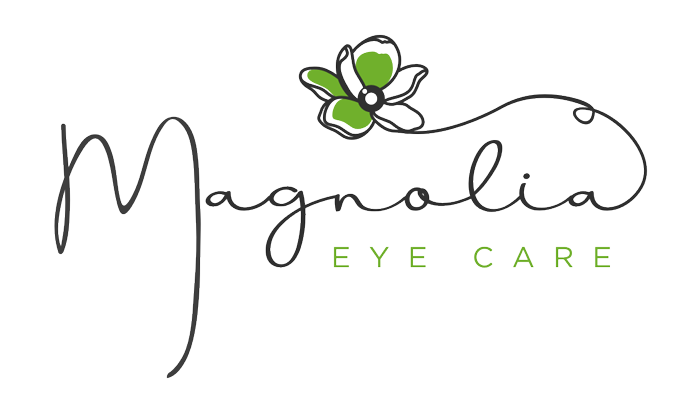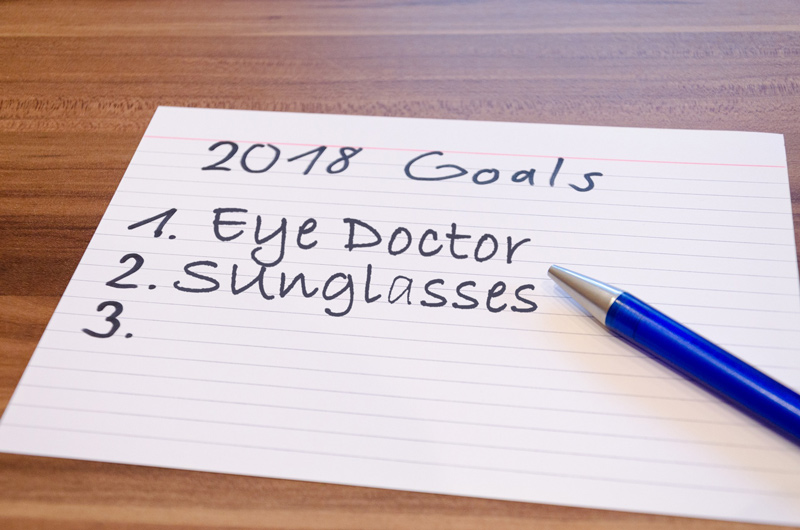Happy New Year! As we ring in a fresh, new year, it’s human nature to consider ways to improve our life experience. These can range from the simple (Drink more water) to the complex (Raise funds for a passion project) to the philosophical (Bark less, wag more).
Better health is often on the agenda; eyesight is a critical component of that. As eye care professionals, we offer six simple, effective ways to ensure your eye health in 2018:
- 1. Know Your Family’s Eye Health History
Knowledge is power! Many eye diseases and conditions including age-related macular degeneration, glaucoma and diabetic retinopathy have a genetic component and tend to run in families. Familiarize yourself with your family’s eye health history and share it with your eye doctor so you can catch any potential signs of disease early, when treatments are most effective.
- 2. Follow Proper Contact Lens Protocol
Remember the first time you tried contact lenses? It felt like a miracle to see so well, didn’t it? Contacts are certainly a convenient vision correction solution. But, if you don’t take care of them, they can cause serious problems. Follow your eye doctor’s instructions for proper care and wearing of your specific lenses. Don’t skimp on cleaning or storing lenses, and don’t wear them for longer than recommended. Failing to follow directions puts you at risk for infections, abrasions, and even permanent vision loss. Resolve to be contact-lens-compliant in 2018.
- 3. Eat Healthfully for Healthy Vision
Here’s a resolution that might dovetail with other healthy habits: eating right can help keep you seeing right. Getting the proper balance of nutrients; vitamins A, C and D; Omega-3 fatty acids; bioflavonoids and antioxidants plays a part in healthy vision. Studies show that a healthy diet can reduce the risk for age-related vision problems including macular degeneration, cataracts and glaucoma. Aim to incorporate more of these in your diet in 2018:
- Red or orange peppers, sweet potatoes, carrots, broccoli, spinach, kale and other green, leafy vegetables (for beta-carotene and Vitamin C)
- Tea, citrus fruits, cherries, berries and legumes (for bioflavonoids)
- Tuna, mackerel, salmon, anchovies and walnuts (Omega-3 fatty acids)
- Liver, beef, oysters and fortified dairy products (Vitamins A and D, zinc)
- 4. Utilize Safety Eyewear
Each day, emergency rooms across our country see about 2,000 eye injuries, according to Prevent Blindness America. That adds up to over 700,000 per year! There are also around 125,000 eye injuries that happen in and around the home, plus and 25,000 sports-related eye injuries each year—nearly half of which are to children under age 14. And while 10-20{292cc3b5301b60554126ab1d65e6244992d5e505d8a733ba82d7605faad99183} of all of these injuries will cause temporary or permanent vision loss, a full 90{292cc3b5301b60554126ab1d65e6244992d5e505d8a733ba82d7605faad99183} of them could be prevented by wearing the proper eye protection. You can keep your vision and that of your family and kids safe by wearing the right eye protection at work, at home, and while playing sports. Tell your eye care professionals about your lifestyle and we will recommend the ideal protection for your needs.
- 5. Wear Sunglasses 365 Days a Year
Just because it’s wintertime doesn’t mean the sun’s UV rays can’t harm your eyes. In fact, glare from the sun can be particularly harsh in winter, and UV rays reflecting off surfaces including snow, pavement, metal and water can damage your eyes year-round. UV exposure is associated with an increased risk of cataracts and age-related macular degeneration. Proper sunglasses will block at least 99{292cc3b5301b60554126ab1d65e6244992d5e505d8a733ba82d7605faad99183} of both UVA and UVB rays. Our optical associates can help you select a great pair of sunglasses that will protect your eyes as they project your style. Find a pair you love and wear them every day to protect your eyesight!
- 6. Follow the 20/20/20 Rule
With screen time on tablets, phones, laptops and desktops at record high levels, many of us are hunching our shoulders and straining our eyes to catch up on the latest news and posts. This increased screen time can lead to Computer Eye Syndrome, characterized by tired eyes, blurry vision, difficulty focusing, dry eyes, headaches and shoulder or neck pain. To relieve the effects of Computer Eye Syndrome, follow the 20/20/20 rule. Every 20 minutes or so, give your eyes a break by looking at something 20 feet away for at least 20 seconds. It’s a quick and easy way to relieve some of the strain screen time puts on our eyes.
- 7. Schedule A Comprehensive Eye Exam
Protect your precious gift of sight, and do the same for each member of your family. By scheduling a comprehensive eye exam, you can determine whether your vision is at its best, update prescription eyewear or contact lenses, determine the best safety glasses for your lifestyle, and be screened for many potential eye issues or diseases that could dramatically impact your vision. We’ll “see to it” that you get the best possible treatment to preserve your eyesight in this new year―and always!

